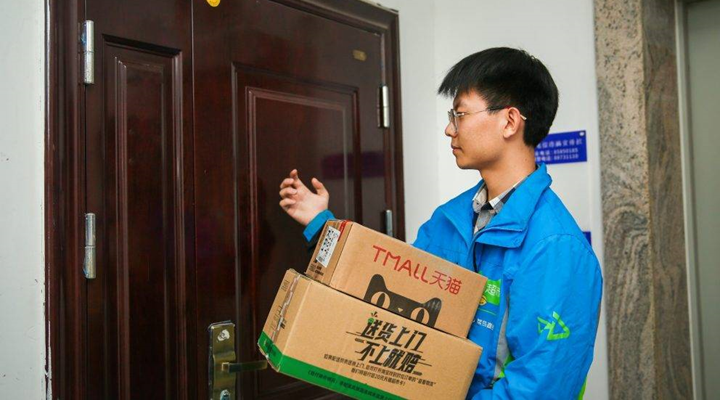As China’s economy grapples with the aftermath of the pandemic, e-commerce giants Alibaba and JD.com are pulling out all the stops for their annual Singles Day shopping festivals, with both players set to unleash an unprecedented level of discounts and deals. While Alibaba seeks to offset declining consumer confidence with a wide array of 80 million discounted products and price reductions of up to 15 per cent, JD.com has chosen to break away from traditional pre-sales, offering genu
enuine low prices on over 800 million products right from the get-go.
Alibaba expects about 1 billion consumers to participate in the 11.11 event from 23 October through 11 November.
For the 2023 Taobao Tmall 11.11 Global Shopping Festival, as it is officially known, shoppers will also be able to call on artificial intelligence (AI) to help them find the best bargain around.
Started by Alibaba in 2009 with just 27 brands, 11.11 is now in its 15th year. Initially, a 24-hour online sale, 11.11 has expanded globally with retailers offering Singles Day sales in the US, Europe and Southeast Asia.
The number of products, brands and merchants participating in 11.11 this year continues to hit new highs. About 46,000 brands and merchants worldwide will promote overseas products on Alibaba.
Interestingly, Singles Day was created by students at Nanjing University in 1993 to celebrate their single status. In 2009, Alibaba transformed the holiday from an “anti-Valentine’s Day” into the 11.11 Global Shopping Festival.
In this fiercely competitive “value-for-money battle,” what strategies will prove to be the most effective in capturing consumer wallets? And what does it mean for the broader retail landscape in China?
To shed light on these pressing questions, we sat down with Xiaofeng Wang, an analyst from Forrester, for an exclusive interview.
The current state of affairs
According to Wang, the significance of Alibaba and JD.com’s aggressive discounting is all about meeting consumer expectations.
“Consumers consider Double 11 (Singles Day) as the biggest promotion of the year and expect deep discounts. It’s proven to be a key driver of growth from previous shopping festivals such as 6.18,” she told Inside Retail, referring to another major shopping event in China, which JD.com initially launched as an anniversary sale.
Alibaba’s Taobao and Tmall platforms are both offering massive rebates and discounts, and Wang believes there is a strategic intent behind this.
“The competition is higher than before, especially with the rise of newer players like Pinduoduo, Douyin and Kuaishou that offer aggressive subsidies and discounts. Chinese consumers are more hesitant to spend under the current economic situation, therefore deep discounts can nudge them to spend,” she added.
Interestingly, JD.com is adopting a ‘real cheap’ theme and putting more than 800 million products on sale for three weeks, and Wang believes that there is a key differentiator in this promotional strategy.
“They are offering a 30-day low price guarantee with easy refund for price difference, and there are no pre-sales, which is to make a deposit and buy later. There is no need to wait, one can buy directly from the first day onwards,” she noted.
With Chinese consumer spending remaining flat and economic pressures mounting, Wang thinks the low-price strategy adopted by e-commerce giants will effectively boost consumer spending, as it was proven to be effective for the 6.18 shopping festival too.
The big picture
In terms of strategies that Alibaba and JD.com employ as compared to newer players in the market like Pinduoduo and Kuaishou Technology, a short-form video platform similar to Douyin, or China’s version of TikTok, Wang said that both Alibaba and JD.com have advantages in technology and logistics.
“Cainiao Network, Alibaba’s logistics arm, recently rolled out a half-day express delivery service in Beijing before the upcoming shopping carnival, in a bid to boost the logistics and delivery efficiency. While, JD.com planned to use generative AI to help merchants to generate copies and images to boost efficiency,” she explained.
While aggressive discount campaigns are generally understood to hurt retailers’ profitability, if not their revenue, Wang does not believe that to be the case in this instance.
“Big shopping festivals like Singles Day, no matter how they become bigger and more frequent (almost each month like Double 9, 10 and 12), still only make up a small portion of annual GMVs (around 5 per cent), therefore it won’t affect the overall profitability and revenue in the grand scheme of things. It will be compensated with a large scale of transactions as well,” she said.
For Alibaba, which recently split up into six separate business units, including Taobao Tmall Commerce Group, one of the most established ones, Singles Day has only become more, not less, significant.
“It’s also facing the rising competition from newcomers; therefore the focus makes sense. Singles Day has always been the front stage to showcase Alibaba’s newest tech development and test bed for new business models, its strategic importance never changed,” she opined.
Moreover, traditional retail stores in China are also actively participating in Singles Day promotions too, and Wang said this phenomenon is no longer just an online shopping festival, but more of an omnichannel one.
Ultimately, Wang reiterated that companies like Alibaba and JD.com will still focus on product quality, customer experience and loyalty, and that their promotional strategies are not long-term goals.
“Singles Day is important for any retailers, but it’s only a small portion of annual GMV. It would be a confidence boost for platforms, retailers and merchants, but long-term growth is still more important,” she concluded.

